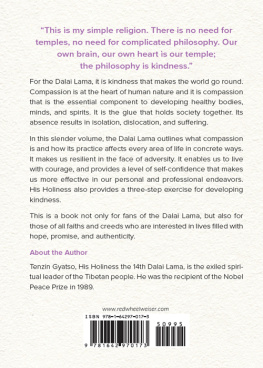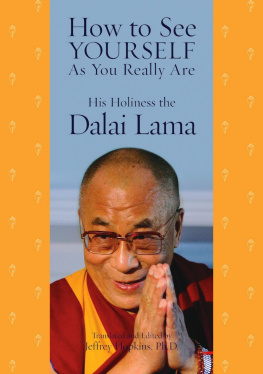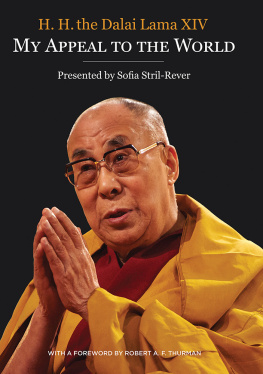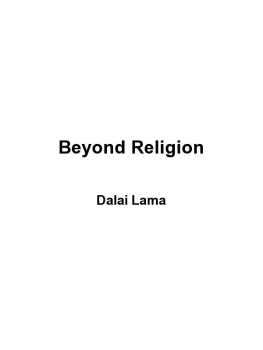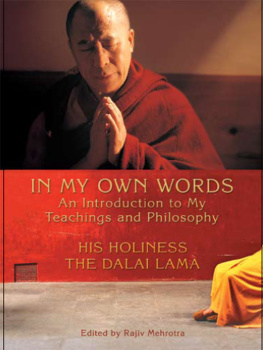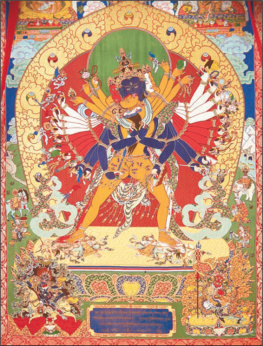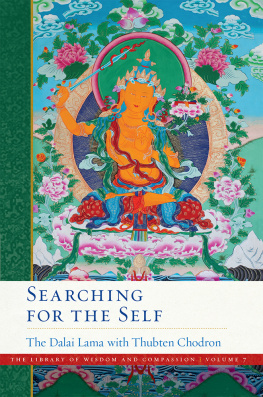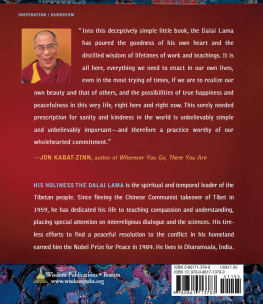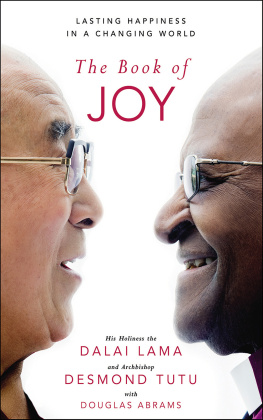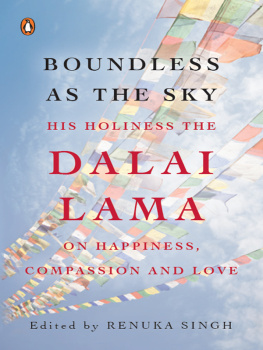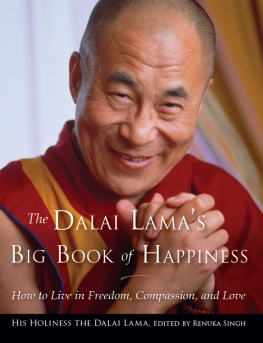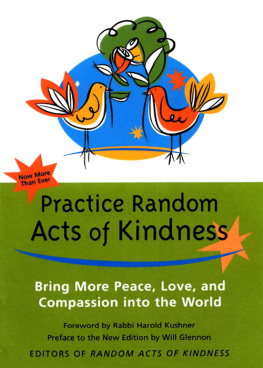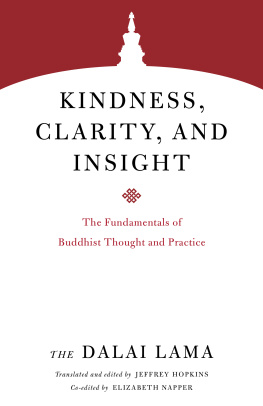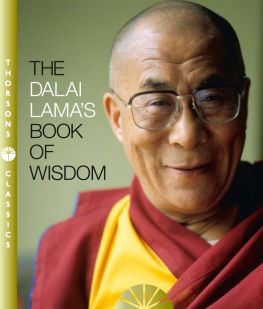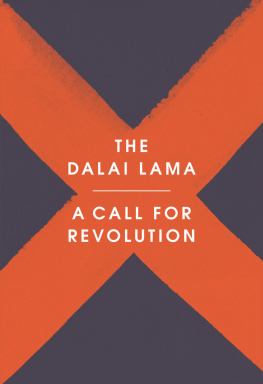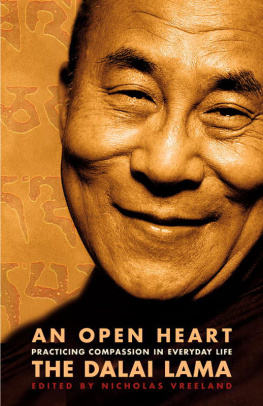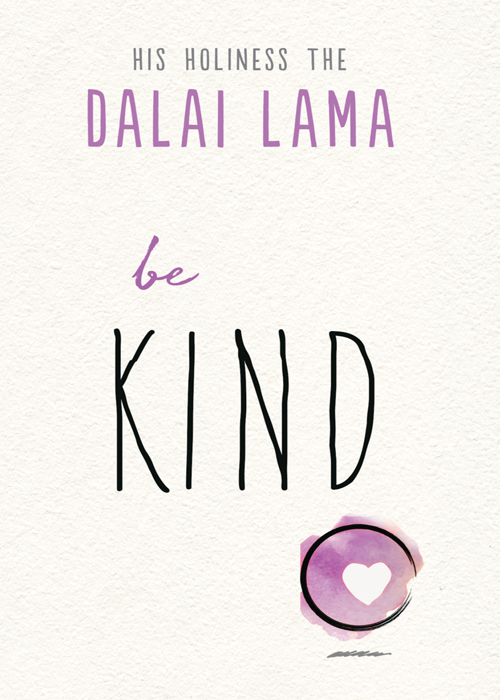

Copyright His Holiness the Dalai Lama 1995, 2019
All rights reserved. No part of this publication may be reproduced or transmitted in any form or by any means, electronic or mechanical, including photocopying, recording, or by any information storage and retrieval system, without permission in writing from the publisher.
Reviewers may quote brief passages.
Published by arrangement with HarperCollins Publishers Ltd
HarperCollins Publishers, The Power of Compassion 1995
Hampton Roads Publishing Company, Inc.
Charlottesville, VA 22906
Distributed by Red Wheel/Weiser, LLC
www.redwheelweiser.com
Sign up for our newsletter and special offers by going to
www.redwheelweiser.com/newsletter.
ISBN: 978-1-64297-017-3
Library of Congress Control Number
available upon request
Printed in the United States of America
BP
10 9 8 7 6 5 4 3 2 1


With his characteristic down-to-earth approach to the Buddhist path, His Holiness the Dalai Lama has often observed of himself that his informal speaking style complements my broken English. This volume has been edited to keep alive his voice and its unique flavor.
Contents
Publisher's note:
His Holiness the Dalai Lama describes himself as a simple monk. The hallmark of his tours and lectures worldwide is his warmth. With humor and simplicity, His Holiness speaks and answers questions on the enormous subject of our humanitylife, death, joy, illness, suffering, attachment, anger, compassionbut most of all, this simple monk tells us:
Be kind.
The fundamental need we all have for kindness is evident in our repetition of one particular quote from the Dalai Lama; it is so often repeated on social media that the phrase has become a meme in its own right:
This is my simple religion. No need for temples. No need for complicated philosophy. Your own mind, your own heart is the temple. Your philosophy is simple kindness.
We all want to be treated with kindness. When we treat others with kindness, we feel fulfilled; we are, in that moment of grace, lifted out of whatever stressful day we've been dealing with. We feel good.
Kindness can be a smile, a friendly gesture, an act of generousity, a charitable donation, a moment of consideration for the needs of someone other than ourselves.
Whether we call it goodwill, affection, care, concern, or gentleness, the act of kindness has its roots inand grows fromcompassion.
His Holiness the Dalai Lama shares with us in this volume his teaching on compassion. He presents a path of giving and receiving and shows us a practical way of directing love and kindness.
In this little book, the Dalai Lama tells us, Be kind.
Be kind whenever possible.
It is always possible.
KINDNESS
C ompassion is the most wonderful and precious thing. When we talk about compassion, it is encouraging to note that basic human nature is, I believe, compassionate and gentle.
Sometimes I argue with friends who believe that human nature is more negative and aggressive. I argue that if you study the structure of the human body, you will see that it is akin to those species of mammals whose way of life is more gentle or peaceful.
Sometimes I half joke that our hands are arranged in such a manner that they are good for hugging, rather than hitting. If our hands were mainly meant for hitting, then these beautiful fingers would not be necessary. For example, if the fingers remain extended, boxers cannot hit forcefully, so they have to make fists.
So I think that means that our basic physical structure creates a compassionate or gentle kind of nature.
If we look at relationships, partnership, marriage, and conception are very important. Marriage should not be based on blind love or an extreme sort of mad love; it should be based on
BASIC HUMAN NATURE IS COMPASSIONATE AND GENTLE.
a knowledge of one another and an understanding that you are suitable to live together.
Marriage is not for temporary satisfaction, but for some kind of sense of responsibility. That is the genuine love that is the basis of marriage.
The proper conception of a child takes place in that kind of moral or mental attitude. While the child is in the mother's womb, the mother's calmness of mind has a very positive effect on the unborn child, according to some scientists.
If the mother's mental state is negativefor instance if she is frustrated or angrythen it is very harmful to the healthy development of the unborn child.
One scientist has told me that the first few weeks after birth is the most important period, for during that time the child's brain is enlarging.
During that period, the mother's touch, or the touch of someone who is acting like a mother, is crucial.
This shows that even though the child may not realize who is who, it somehow physically needs someone else's affection. Without that, it is very damaging for the healthy development of the brain.
After birth, the first act by the mother is to give the child nourishing milk. If the mother lacks affection or kind feelings for the child, then the milk will not flow.
If the mother feeds her baby with gentle feelings toward the child, in spite of her own illness or pain, the milk flows freely.
This kind of attitude is like a precious jewel.
Moreover, from the other side, if the child lacks some kind of close feeling toward the mother, it may not suckle. This shows how wonderful the act of affection is from both sides.
AFFECTION IS LIKE A PRECIOUS JEWEL.
That is the beginning of our lives.
Similarly with education, it is my experience that those lessons that we learn from teachers who are not just good but who also show affection for the student, go deep into our minds. Lessons from other sorts of teachers may not. Although you may be compelled to study and may fear the teacher, the lessons may not sink in.
Much depends on the affection from the teacher.
Likewise, when we go to a hospital, irrespective of the doctor's quality, if the doctor shows genuine feeling and deep concern for us, and if he or she smiles, then we feel okay.
But if the doctor shows little human affection, then even though he or she may be a very great expert, we may feel unsure and nervous.
This is human nature.
Lastly, we can reflect on our lives. When we are young and again when we are old, we depend heavily on the affection of others.
Between these stages of childhood and old age, we usually feel that we can do everything without help from others and that affection from other people is simply not important.
But in these times, more than ever, I think it is very important to keep deep human affectionkindness is crucial to our society and to our survival.
When people in a big town or city feel lonely, this does not mean that they lack human companions, but rather that they lack human affection. As a result of this, their mental health eventually becomes very poor.
On the other hand, those people who grow up in an atmosphere of human
KINDNESS IS CRUCIAL TO OUR SOCIETY AND TO OUR SUR VIVAL.
Next page
